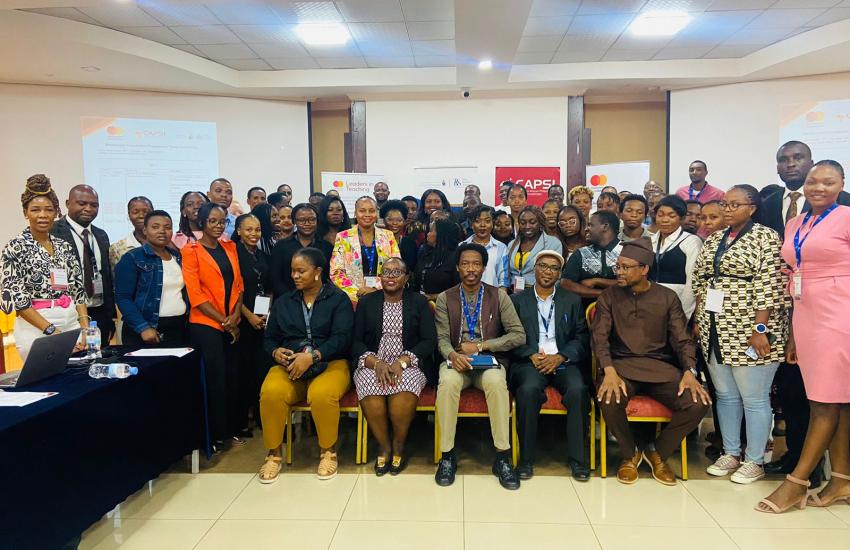IDS takes part in CAPSI-Mastercard project youth convening in Kigali
The CAPSI-Mastercard project is a groundbreaking initiative focused on uncovering the contributions of the non-profit sectors to African economies, with a specific emphasis on creating dignified and fulfilling work for young people. This project, spanning 17 African countries, focuses to bridge available knowledge gaps and shed light on how the non-profit sector can play a pivotal role in youth employment, especially for marginalized groups such as people with disabilities, refugees, and young prisoners.
During a recent convening that was organized by the Centre on African Philanthropy and Social Investment (CAPSI) in Kigali Rwanda, four youths from the Institute of Development Studies represented Kenya where they shared their insights on the contributions of the non-profit sector to dignified and fulfilling work and their role in economic growth in Kenya and Africa at large and also highlighted the crucial role of these non-profit organizations in enhancing productivity, creativity, and sustainable economic growth across Africa.
Major discussions during the two-day convening centered around the economic impact of non-profit organizations, how these NPOs which include non-governmental organizations, activists, and civil societies are promoting employment and increasing the per capita income among the youth, and other activities that affect the economy indirectly, particularly through training and mentorship programs. The concept of dignified work was explored, emphasizing on the jobs that provide a sense of autonomy, self-respect and meet individuals' needs and societal expectations, thereby fostering work satisfaction.
In her remarks during the panel discussions, Mary Ojuang who is the team leader for Women Students Mentorship Association (WOSWA) in Kenya, emphasized on reasons why youths and individuals from marginalized backgrounds should be included and given priority in the project. She outlined marginalization in different ways, “youths feel marginalized when they are not involved in many activities, this makes them feel left out and feel like they are not part of the society.”
Speaking during the convention, Prof. Bhekinkosi Moyo who is the Director for CAPSI stated that, this initiative underscores the critical need to involve youth in shaping and implementing projects that directly impact them. “We decided to directly involve young people in this project, and even in the end of this project, young people will compete in packaging the research outcome in a way that is relatable to them,” She said.
By listening to youth's ideas and perspectives, the CAPSI-Mastercard project aims to ensure that the initiatives it supports are relevant, effective, and inclusive, added Prof. Ayo Ojobode, the Director Research Strengthening and Knowledge Mobilization at Mastercard Foundation. Through such collaborative efforts, the non-profit sector can continue to be a driving force in creating a brighter future for African youth.
For many youths and individuals from marginalized areas to access dignified and fulfilling work, strategies should be implemented including policy and legal interventions. There should be an increase in vocational training, advocate for wage equality, and also improve policy environments. The two-day convention was a success and youth from the Southern and Eastern Africa region shared more and promised to work together till the project is implemented. The project will be available on the CAPSI website by the end of the year.
My experience: Resty Nabaggala, IDS student
I take this opportunity to thank IDS for the recommendation to be part of this youthful space which was very participatory and allowed me to share my work and network with other youth for greater synergies in the future.
This was my first experience of youth being involved in a project that concerns them right from the formulation stage, unlike many projects where they are included in the implementation stage. Thanks to CAPSI and Mastercard for this great initiative. From the experiences shared by various youths, I appreciate that challenges faced by the youth in the field of employment are the same but we all experience them differently being a diverse group.
The convening helped in understanding the contributions of the Non-Profit Sector to African Economies with a specific focus on the creation of dignified and fulfilling work for young people in Africa while analyzing the concepts of dignified and fulfilling work. This approach also disclosed what many young people go through while at their workplaces but most importantly the convening was a time to appreciate the role of the nonprofit sector towards youth employment both directly and indirectly. I look forward to the evidence generated and aggregated data from this project which will help inform policies and practice and add to the literature for people in the research field like me.


